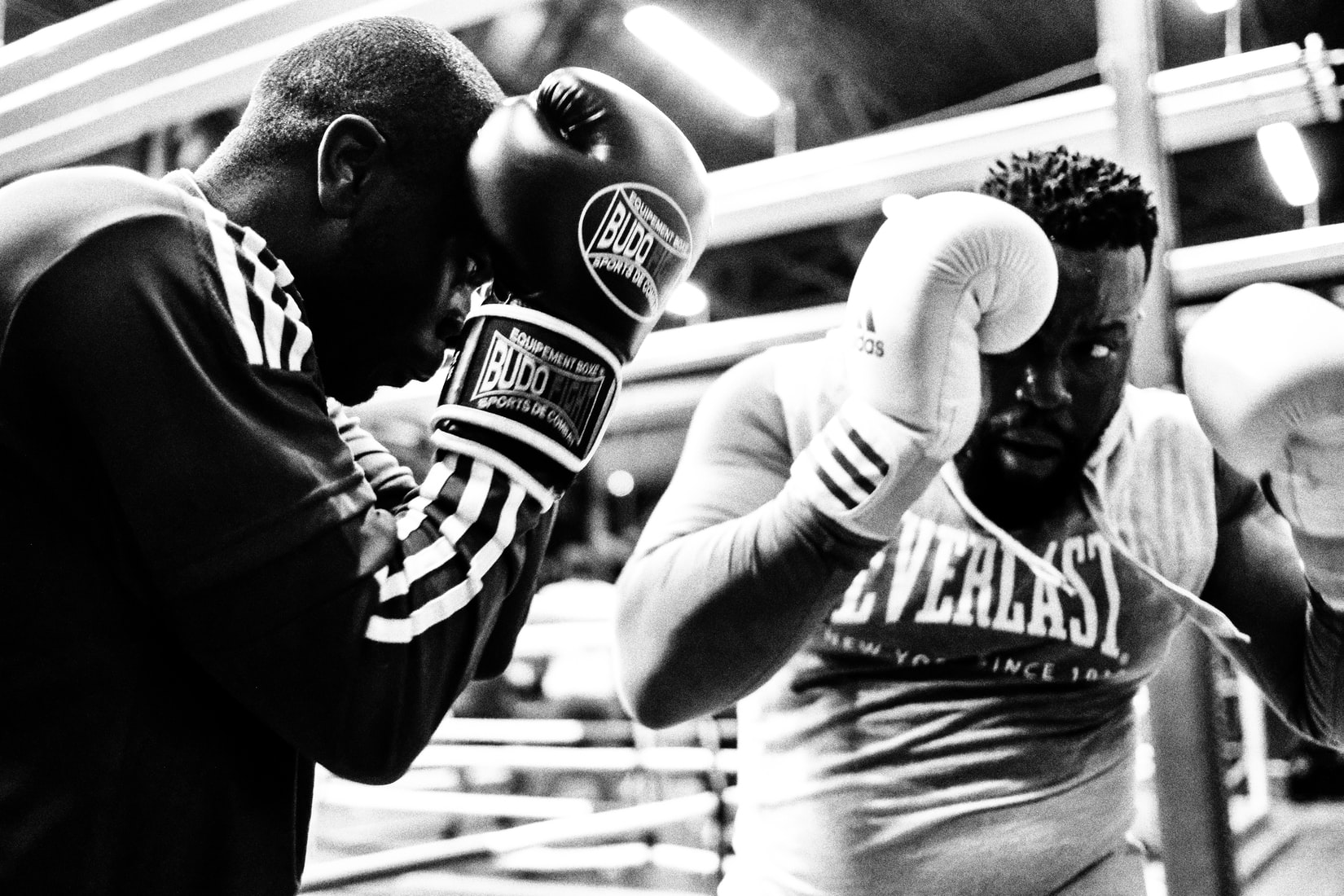Many amateurs that are learning to box or want to take up boxing are often faced with a dilemma - whether they should be sparring whether they’re in the gym or not. This raises an important set of questions for those aspiring boxers - are they missing out on anything by not sparring, or are they being smart by staying out of the ring and avoiding any risk of injury?

This topic is definitely going to incite a few extreme opinions on either side of the spectrum. There are those who think that you’ll never be able to box properly if you don’t spar, and in some ways they’re right; you’re never going to be able to learn to defend yourself if you don’t practice against a living, breathing opponent.
You can’t really practice defence on a heavy bag as it won’t hit you back. However, there are some who are attracted to the sport of boxing for the health and wellbeing benefits and have no interest in training for a fight with someone. Those people also have a valid point.
What I’m going to try and do here is give you my personal opinion on the subject, and the reasons for why. I’ve boxed and sparred before, in my youth, but now I have a heavy bag in my garage and don’t spar with anyone actively. I don’t consider myself a “boxer” in the truest sense of the word - just someone who uses boxing to keep fit, and in all honesty I suspect most readers of this blog are in a similar situation.
What sparring is and what it isn’t
Let’s first take a look into what I mean by sparring. Yes, I know you know what it is - but I’d prefer to look into what it isn’t as well and set the record straight on a few things.
Sparring is effectively practice-boxing. You’re in the ring with someone (ideally someone you trust not to beat you senseless) and the goal is to practice your boxing, practice your defence, your timing, all the other things you’ve been working on with your coach on the bag and the mitts.
Sparring is not about beating someone up, it’s not about showing off and it’s not about hurting someone. There’s a reason that in most gyms they ask you to wear headgear and put on heavily padded gloves (14oz and above.) Your goal is to practice what you’ve learned, provide a platform for your sparring partner to practice what they’ve learned and for you to learn a little more along the way fighting someone who’s actually going to hit you back versus a 100lb leather bag filled with stuffing.
The risks associated with sparring
I will preface this section by saying there are risks associated with nearly every activity. Every time you cross the road, every time you get on a plane, every time you get in your car - you’re taking a risk, and people have been seriously injured and killed doing all of those things. That doesn’t necessarily mean you shouldn’t do them - but it does mean you should take reasonable precautions within the confines of what you can control.
It’s a fact that people have been seriously injured and killed while boxing. Every time you get into a ring, there is a risk of significant brain or head injury. This is why at every sanctioned fight, there is a doctor present - boxers hit and get hit, and this can cause all kinds of damage.
Additionally if you don't take proper precautions like wrapping your hands with cotton hand wraps (or using inner gel gloves) you can also sustain injuries to your hands, which will stop you boxing straight away. Of course, this is also a risk when you punch a heavy bag, but less so - someone's facial bones are a lot harder than a leather heavy bag surface.

Boxing fans will be reminded of the tragic fight in 1985 between Ray Mancini and Kim Duk-Koo, during which Kim sustained a bleed in his brain and died several days after the fight.
This was the reason championship bouts are now limited to 12 rounds - before this they were limited to 15. British boxing fans may also be reminded of the fight between Nigel Benn and Gerald McClellan which left McClellan brain damaged and permanently disabled.
Now, these incidents are rare, and in all honesty, there is a lot of bad luck involved in them, but the fact remains that when you step into a ring, you are risking your health. I’m willing to bet that most readers here do not have a boxing pedigree, they did not box in their youth and have never boxed competitively.
You might rely on your brain to do your job, to earn your living. Is it worth the risk of not being able to do that any more to get into the ring for three rounds with someone?
It’s worth mentioning that professional fighters experience this despite being trained by the best coaches in the world how to defend themselves. If you’re just some guy who goes to the gym three times a week, have hit the bag a few times and now think you can take Tyson on in the ring - in my view, you’re taking a very naïve view of your own ability and your own health by thinking you can just jump into the ring without consequence.
Does this mean sparring is dangerous?
Not entirely. The risks associated with sparring are largely preventable providing you’re in a safe environment, sparring in a controlled way and with someone you trust. Think about it - there are reasons that so many rules and regulations surround boxing. When you jump into the ring with a sparring partner, you are play-boxing - in a controlled, organized manner. Providing you’re not in there with someone who’s itching to kick the stuffing out of you, and you take the proper precautions, sparring every once in a while is probably not going to do you any lasting harm.

I liken it to learning to drive a car. You can read up on the physics and mechanics of driving a car - you can sit there and watch YouTube videos about what the clutch does, how to change gear, which observations to take as you move off, etc - but none of that is really going to teach you anything until you get into a car and practice it.
And with that comes an element of danger - you could do something really stupid and crash into something. You could hit a pedestrian and go to jail. But until you take that risk, you’ll never learn anything.
The same is true with boxing. Of course, you’ll be able to practice the moves on a heavy bag and on a double end bag, but you’ll never truly know how to box until you get in there with a human opponent and go for a few rounds. You’ll never truly be able to practice your footwork, your timing, your defence, etc - without trying it on a real person.
I will say there are fitness benefits to sparring as well - when you’re working the heavy bag, the heavy bag doesn’t demand anything from you. If you want to stop punching, the bag won’t argue. However, if you’ve said to your sparring partner “let’s go six rounds,” you can be damn sure he’ll go six rounds with you.
Coupled with the fact that you’re hitting and getting hit, as well as moving around a lot more, you’re going to get a lot more of a workout in the same amount of time.
Why do you want to box?
To be honest, a lot of this comes down to you, who you are and why you want to box. I’ve assumed that most reading this article are novices who want to use boxing for the fitness and conditioning, but it could be that a lot of you are looking to learn how to actually defend yourself.
I had a friend once who was mugged and was embarrassed that he couldn’t fight them off - so he took up Tae Kwon Do. A little extreme, but I fully understand the logic - and if you’re in a similar situation you’re not going to learn how to actually fight anyone off by just working the heavy bag every so often.

Conversely, you could be a high powered executive who works exceptionally hard and needs a release, and this release could come in the form of knocking the stuffing out of a punchbag after work. You’re not really in a position where you need to be learning to fight someone - you’re just looking to use boxing as a tool to help you release stress and become a little healthier.
There’s nothing wrong with either of these approaches - both are as valid as another. If you’re looking to actually get into boxing and actually have amateur fights - then of course you’re going to need to learn how to spar.
However, if you’re not in a situation where you’re ever going to need to fight someone, then really there’s no need to expose yourself to that risk if you don’t want to. Like I said before - if you use your brain to earn your living and you’re concerned about the potential injuries you might sustain in the ring, then don’t feel obliged to spar with anyone - and there’s no shame in that.
My personal opinion
Personally I feel you should do what makes you comfortable. I don’t spar any more - by choice. I just don’t need to - I’m not training for any particular event, and I use boxing as a way to keep fit and to release some aggression. I don’t need to spar for that - although you can if you want to.

As I’ve said a few times - it comes down to what you want to get out of boxing. There’s nothing wrong with just using boxing as a tool to get fitter and healthier - it’s what I use boxing for.
There’s also nothing wrong with using boxing as a way to learn to defend yourself - it’s what I have used boxing for in the past. Both approaches are valid, and it’s a decision you need to make for yourself as to which camp you fall into and what you want to get out of your training.
So, can you learn boxing without sparring?
To answer the original question - yes, you can learn to box without sparring. Don’t expect to be able to use those skills without practicing them though. If you want to be a real “boxer” - and actually have the skills to fight someone off, there’s no better place to practice those skills than in the ring. If you’re not interested in this, there’s no shame in it and you carry on punching the stuffing out of that heavy bag.
Check out some of our other boxing content and reviews!


0 comments